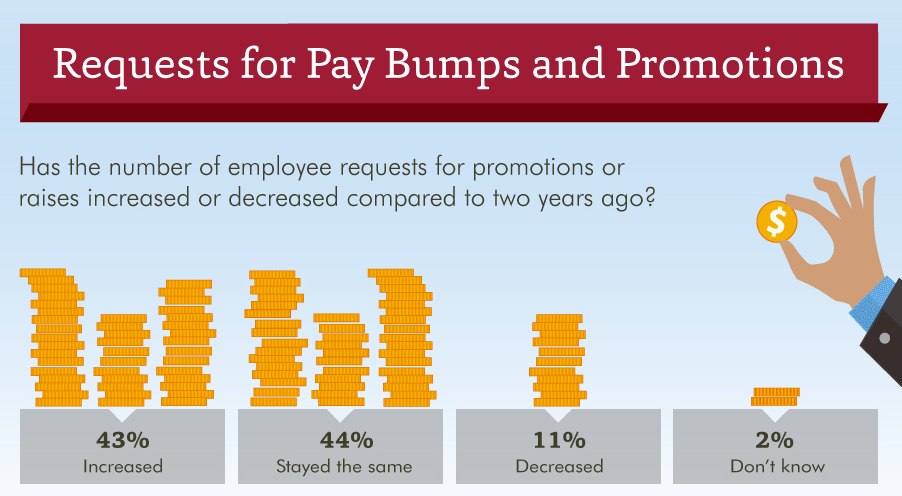Raise and Promotion Requests Rising
“It's better to be prepared than surprised by an employee's request for a raise or promotion"
If managers are not already fielding requests from employees for raises and promotions, they soon may be. According to a recent survey from staffing firm Accountemps, 43 percent of chief financial officers (CFOs) interviewed said the number of requests for raises or promotions has increased from two years ago.
Source: Accountemps. |
An Accountemps Blog post notes that a recent U.S. Bureau of Labor Statistics report shows workers are quitting their jobs at the highest rate in six years. “An improving economy and higher demand for skilled workers means professionals are more confident in their job prospects and on the hunt for bigger paychecks and loftier titles,” according to the firm.
“Employers must be proactive and closely scrutinize compensation levels to stay competitive and keep good staff,” said Bill Driscoll, a district president with Accountemps, in a related news release. “It's better to be prepared than surprised by an employee's request for a raise or promotion,” he added. “Now's the time to proactively connect with key team members to identify advancement opportunities and discuss viable career paths.”
“Meet with your team members to discuss their career paths, and offer resources and training to help them meet their professional goals,” the firm’s blog advises. “If their responsibilities have outgrown their job descriptions, it’s probably time to promote them.”
Other Retention Incentives If the bottom line doesn’t allow for increasing salaries, Accountemps suggests providing other incentives to keep employees onboard and engaged, including: • More vacation time. Offering extra days off each year can make a meaningful difference to employees. • Telecommuting or flexible schedules. The ability to work from home or commute during off-hours may save your employees time and money, while helping them achieve better work/life balance. • Professional development. Providing training or continuing education shows you’re committed to their long-term growth with the company. • Bigger bonuses. While you might be limited when it comes to salary increases, you might have the flexibility to boost employees’ annual bonus percentage or give spot bonuses for standout work. • An equity stake. Consider offering restricted stock based on employee performance. |
Stephen Miller, CEBS, is an online editor/manager for SHRM. Follow him on Twitter @SHRMsmiller.
Related Articles:
Why Career Management Programs Miss the Mark, SHRM Online Benefits November 2014
Salary Gripes Are Top Reason Employees Quit, SHRM Online Compensation, October 2014
After-Inflation Wages Accelerating, Data Show, SHRM Online Compensation, October 2014
Quick Links:
- SHRM Online Compensation Topics & Strategy
- SHRM Salary Survey Directory
- SHRM Compensation Data Center
- SHRM Metro Economic Outlook reports
To subscribe to SHRM's Compensation & Benefits
e-newsletter, click below.
Sign Up Now
Advertisement
An organization run by AI is not a futuristic concept. Such technology is already a part of many workplaces and will continue to shape the labor market and HR. Here's how employers and employees can successfully manage generative AI and other AI-powered systems.
Advertisement



